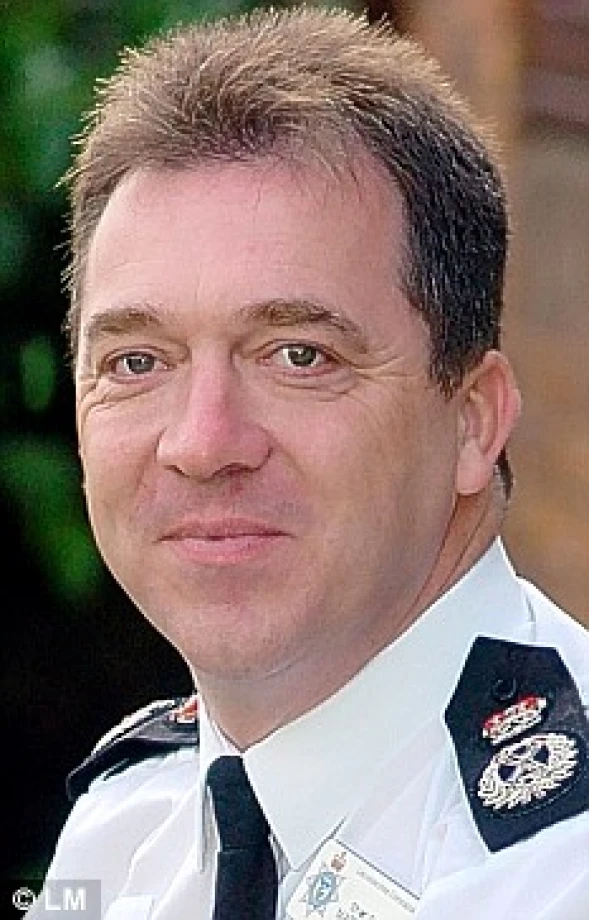Chief Constable shares his faith at St Finnian's
Mr. Matt Baggott CBE QPM, the Chief Constable of the Police Service of Northern Ireland, recently addressed a large audience at a meeting of the St Finnian's Men's Society.
He began by saying, 'I have a living faith in Jesus Christ.’ These opening remarks were made lightly and matter of factly, yet no one in the audience was left with a shadow of doubt that they were spoken by a man revealing the guiding star of his life.
Mr. Baggott was born in South London, a true Londoner. His father was a confirmed atheist. However, in later life, he faced a major life-threatening operation, which compelled him to pray for help from a God he did not believe in. During his subsequent recovery his father had a very personal encounter with Jesus. Urged by his son to read the Bible the old man replied ‘When you have met Jesus personally there is no need to read the Bible.’ Mr. Baggott’s own favourite passage in the bible is Chapter 21 in St. John’s Gospel. There the disciples are recorded fishing in the Sea of Tiberias when they spot Jesus standing on the shore. For Simon Peter especially, this is a moment of acute embarrassment. He had recently denied Jesus three times. He does not know what to do and he inexplicably risks drowning himself by putting on his clothes before jumping into the sea. The disciples arrive on shore and instead of greeting Jesus they count the number of fish they have caught. As a policeman examining evidence, this irrational behaviour can only mean that the account as recorded must be true.
In 1977, as a teenager, Mr. Baggott joined the Metropolitan Police Service. As a young man he had a vision of himself as a daring Panda car driver. However, at that time many of his superiors in the Service were men who had been through the blitz and were imbued with an old-fashioned courtesy towards members of the public. A popular television programme at that time, Dixon of Dock Green, exemplified the empathy which existed between the police bobby and the public. Mr. Baggott illustrated this with an incident involving himself. A man dressed in his best suit and wearing his war medals entered the station. For this man an encounter with his local police was an important occasion. Mr. Baggott greeted the visitor with ’Howdy mate’. His superior officer rebuked him and said’ you address that man as Sir. You address every member of the public with the utmost respect’. Mr. Baggott added that he learned early in his police career the importance of relations with individual people and the creation of trust between a police force and the public it serves. He cited an occasion when a police chief he served under, placed a young police officer in a local post office with instructions to meet the old ladies of the district and win their trust and confidence. This experiment bore rich fruit, as those old ladies knew everything, which happened in their locality.
In the 1980’s Mr. Baggott was promoted sergeant and transferred to Brixton. It was there he first noticed a trend where the police withdrew more and more from a close relationship with the public. As he rose through the ranks he was concerned about how this drift could be reversed. He served with the Metropolitan CID, later moved to the Midlands and finally Chief Constable of Leicester. Here his workload was heavy and for a time busyness took over his life. He was rescued by a woman who stubbornly refused to be denied an interview with him. When she did see him she said’ God told me to give you a gift of these scales’. He was astonished but later realised that those scales demanded that he get balance back into his life and have the place of God restored.
Mr. Baggott said that he never conscientiously planned the course of his police career. Each step, when it came, seemed natural and right, as if in the hands of providence. His appointment to Belfast came at a time when a desirable option was retirement due to his many years of service. It was at this time a fellow officer who had been bestman at his wedding, phoned him from London. He was not, as Mr. Baggott remarked, a very religious person, but he had a dream, the most vivid he ever experienced in his life, in which it was clear to him that his friend, Baggott, would go to Belfast as the best man for the post. Mr. Baggott put his name forward.
Mr. Baggott concluded by saying how privileged and honoured he was to be Chief Constable of the PSNI and added how impressed he was by the quality of its police officers. To provide a police service, which reaches out to people in their local communities, he decided to put 600 police officers on the beat. Some of his advisors suggested to him that it could not be done. As of today 600 officers are now on the streets of Northern Ireland getting to know the people who live there. Mr. Baggott answered many questions cheerfully and without hesitation. Those leaving that evening went home more hopeful that their police service was in safe hands .
Article by Dr Roddy Evans
